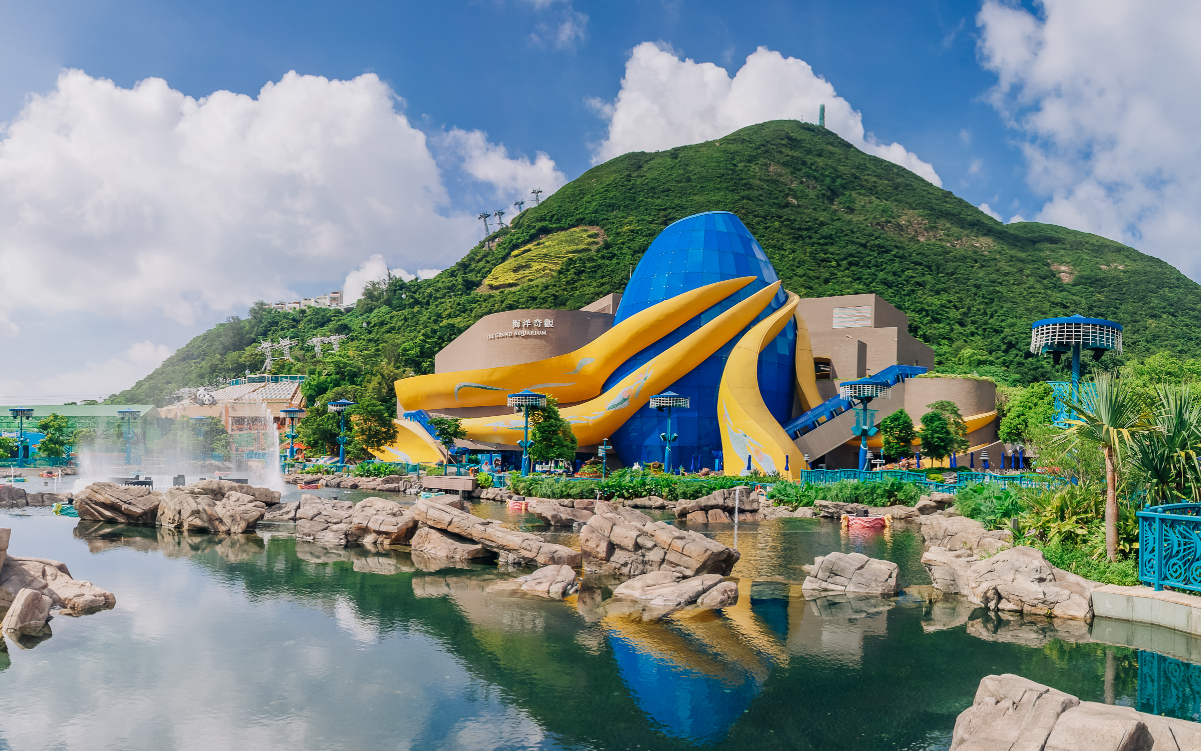(30 June 2011, Hong Kong) Ocean Park Conservation Foundation, Hong Kong (OPCFHK) and Ocean Park have joined hands with the Hong Kong SAR’s Development Bureau to support the restoration of giant panda habitats affected by the 2008 Sichuan earthquake. Construction of the key projects—the world’s first Giant Panda Conservation and Disease Control Centre in Dujiangyan and the China Conservation and Research Centre for Giant Pandas in Wolong—have already started after consultations were completed and designs finalized. OPCFHK, Ocean Park and the Development Bureau have unveiled two main features of the design–animal management and public education. Mr. Zhang Hemin, Chief of Wolong Nature Reserve Administration also shared with the media his experience of exchanging insights with Ocean Park and other local conservation facilities during the first-ever Study Tour for Sustainable Development in Wolong Nature Reserve, which aims to help formulate development and management strategies that suit the situation and needs in Wolong. To further their commitment to helping Wolong and Hong Kong promote giant panda conservation, OPCFHK, Ocean Park and Wolong Nature Reserve Administration today signed a framework agreement to strengthen their collaboration.
Mr. Matthias Li, Trustee Member of OPCFHK, said, “We are grateful to the Development Bureau for inviting OPCFHK and Ocean Park to serve as volunteer technical advisors, giving us an opportunity to utilize our years of experience in caring for giant pandas and extensive conservation knowledge to assist in the construction of these two key projects. The Dujiangyan Giant Panda Conservation and Disease Control Centre aims to rehabilitate and care for injured or ill-stricken giant pandas while the China Conservation and Research Centre for the Giant Panda focuses on research into the husbandry of giant pandas and the restocking of wild populations. Both centres will be open to tourists for visit when construction is completed, thus enabling the public to better understand the importance of giant panda conservation through observation and guided tours.
“OPCFHK and Ocean Park mainly offer concrete advice and recommendations regarding animal management and public education. The former includes the design of the exhibit and back-of-house areas, use of construction materials and concerns about animal safety. For example, to ensure the safety of giant panda, lead-free, durable paint as well as floorboards that are easy to clean and sterilise should be used to in areas where pandas would enter. As for public education, major topics include: methods and key points for communicating conservation messages within and beyond the centre, guided tours for visitors and corresponding arrangements, use of language and graphics, and more. Additionally, the Development Bureau, OPCFHK and Ocean Park join hands to organize the first Study Tour for Sustainable Development in Wolong Nature Reserve. The tour allows conservation experts and project leaders engaged in the Wolong rebuilding project to explore Ocean Park and other local conservation facilities to share insights on how to strike a balance between environmental conservation and urban development as the basis of the humanitarian endeavour of building giant panda habitats. The Giant Panda Base Rebuilidng Fund, established by OPCFHK, has raised over HK$7.36 million to support various restoration and research projects, as well as provide field monitoring equipment, and so on.
“The signing of the framework agreement represents a new level of commitment on the part of both OPCFHK and Ocean Park to collaborate with Wolong in promoting public awareness of panda conservation in Wolong and Hong Kong.”
Mr. David Tong, Principal Assistant Secretary (Works) for Development Bureau, said, “We care greatly about the rebuilding of the Wolong National Nature Reserve and would do our best to assist them to become a world-class wildlife conservation and education research centre. We would like to thank OPCFHK and Ocean Park for serving as honorary technical advisors for the Development Bureau, and for volunteering the time along with the Architectural Expert Team, comprised of respected architects from China and Hong Kong, to make multiple visits deep into Wolong. They engaged in exchanges with local experts, offered professional suggestions on the design of the Dujiangyan Giant Panda Conservation and Disease Control Centre and the China Conservation and Research Centre for Giant Pandas to ensure the projects meet building quality standards and requirements in terms of eco-friendliness, conservation, animal safety and management, education and scientific research. Construction of both centers commenced with the entire cost of about HK$376 million funded by the Hong Kong SAR government. The two projects are expected to be completed in late 2012 and early 2013.
“While Wolong is a national nature reserve and giant panda base, it is also a residential area with more than 5,000 villagers. Therefore, the Wolong reconstruction project by Hong Kong is not limited to rebuilding the nature reserve and giant pandas’ habitats, but also involves looking after the residents’ livelihood and basic infrastructure needs. The Hong Kong government has allocated about HK$1.584 billion to 23 projects, under two main categories. A total of HK$834 million has been allocated to the first category of 11 projects. These projects aim to restore the natural habitat of the reserve, and the research facilities for giant panda conservation, which include the development of the two centres. At a total cost of HK$750 million, the second category involves 12 social welfare projects, which include electricity and energy installations, water supply and drainage systems, refuse disposal and transport systems, geological disaster management, restoration of local roads, schools, medical and health care facilities, social welfare centres and more. Currently, HK$856 million of the total has already been disbursed. With the exception of one project on the master planning of Wolong, which has already been completed, all projects have already begun construction. In addition to funding the development of physical infrastructure, the Development Bureau is also providing support to Wolong’s long-term development.”
Mr. Zhang Hemin, Chief of Wolong Nature Reserve Administration, said, “The Dujiangyan Giant Panda Conservation and Disease Control Centre will separate the area for the care and breeding of the core population from the zone for disease control, thus ensuring that the core population can maintain itself and develop in safety. The China Conservation and Research Centre for Giant Pandas, on the other hand, will enhance the quality of research in giant panda conservation and develop eco-tours focused on giant pandas, thus promoting synergies in social, economic, cultural and native conservation developments within the reserve area. We have benefited greatly from the tour as we saw first-hand Ocean Park’s excellence in conservation education and animal care training. OPCFHK has also offered us concrete advice on saving energy, materials and water, which would help the two centres achieve the highest ‘Three Star’ rating in China’s Green Building Evaluation Standard. We hope to apply some of these inspirations to our management of the centres when they have been completed, making the work of giant panda conservation more efficient. We sincerely thank the Hong Kong Government, OPCFHK, Ocean Park and the Hong Kong public for the continuous support, leading us to the accomplishments for the rebuild of Wolong Nature Reserve.”
Co-organized by the Development Bureau and OPCFHK, the Study Tour for Sustainable Development in Wolong Nature Reserve is a continuation of the Wolong Nature Reserve Sustainable Development Workshop. Both aimed to enable China to leverage on Hong Kong’s experience in managing natural environments and animals to develop management strategies for sustainable development of Wolong. The 22-member study tour team is comprised of leaders, experts and mid-level management involved in Wolong Rebuild. They conducted exchanges and site visits with Ocean Park and other local conservation bodies, as well as animal care experts from 27th to 30th June. To assist Wolong in formulating a strategy for sustainable development, the Development Bureau and Sichuan’s Forestry Department organized the Wolong Nature Reserve Sustainable Development Workshop in Chengdu on 24 June. During the workshop, experts and academics from Sichuan and Hong Kong, including OPCFHK, Sichuan University, University of Hong Kong, Chinese University of Hong Kong, Hong Kong Polytechnic University and Hong Kong Baptist University, exchanged experience with Sichuan representatives and discussed sustainable development strategies for Wolong.
In 2011-2012, OPCFHK has granted over HK$2 million to support different conservation and scientific research projects related to giant panda, including bamboo and vegetation recovery in giant panda habitats after the earthquake. Giant panda conservation research funded by OPCFHK has achieved encouraging progress. For example, in the course of studying the recovery of ecological corridors for giant pandas, it has identified the area between Niuweihe Nature Reserve and Huangbaiyuan Nature Reserve as a potential ecological corridor connecting two giant panda populations. OPCFHK will continue to support those related rebuild projects, including research in the giant panda’s habitat selection and the development of conservation educators in China.







